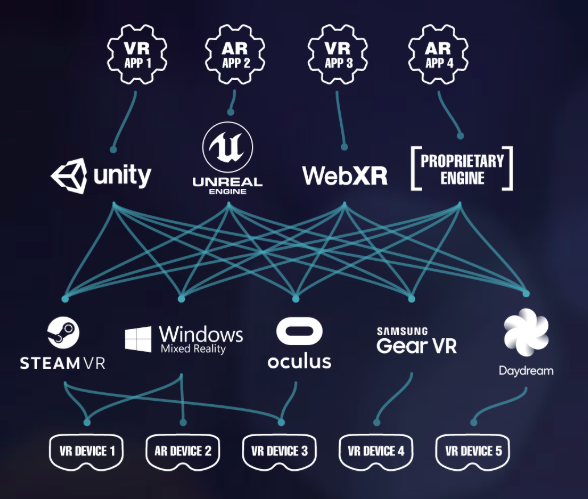Khronos Releases OpenXR 0.90 Provisional Specification for Access to AR and VR Platforms
Today, The Khronos® Group, an open consortium of leading hardware and software companies creating advanced acceleration standards, announces the ratification and public release of the OpenXR™ 0.90 provisional specification. OpenXR is a unifying, royalty-free, open standard that provides high-performance access to augmented reality (AR) and virtual reality (VR)— collectively known as XR—platforms and devices. The new specification can be found on the Khronos website and is released in provisional form to enable developers and implementers to provide feedback at the OpenXR forum.
The OpenXR 0.90 provisional release specifies a cross-platform Application Programming Interface (API) enabling XR hardware platform vendors to expose the functionality of their runtime systems. By accessing a common set of objects and functions corresponding to application lifecycle, rendering, tracking, frame timing, and input, which are frustratingly different across existing vendor-specific APIs, software developers can run their applications across multiple XR systems with minimal porting effort—significantly reducing industry fragmentation.
The Khronos OpenXR working group was formed in early 2017 with the support and participation of leading XR companies. Throughout the development of the specification, multiple Khronos members have been developing independent implementations to ensure a robust and complete specification. Many of these implementations are becoming available for developers to evaluate including the ‘Monado’ OpenXR open source implementation from Collabora and the OpenXR runtime for Windows Mixed Reality headsets from Microsoft shipping today. Additionally, the Unreal Engine from Epic plans to continue to support OpenXR.
Links to these implementations and more information can be found on https://www.khronos.org/openxr.
“OpenXR seeks to simplify AR/VR software development, enabling applications to reach a wider array of hardware platforms without having to port or re-write their code and subsequently allowing platform vendors supporting OpenXR access to more applications,” said Brent Insko, lead VR architect at Intel and OpenXR working group chair. “The OpenXR provisional specification—together with the runtimes publicly available at launch and coming in the next few weeks—will enable hands-on, cross-platform testing by application and engine developers. The working group welcomes developer feedback to ensure an OpenXR 1.0 specification that truly meets the needs of the XR industry.”
Industry Support for OpenXR Provisional 0.90
“Being dedicated to royalty-free open standards and open source technologies, Collabora is proud to be one of the major contributors of the OpenXR working group and its first release today. In addition to this milestone, Collabora is excited to announce Monado, an open source implementation of the newly released OpenXR spec. More than just a vendor SDK, Monado is an open source project and codebase to harness and focus wider community effort around XR technologies,” said Philippe Kalaf, CEO, Collabora.
“Epic believes that open standards like OpenXR are essential foundations for a vibrant, multi-platform VR and AR industry in the coming years. We’ve supported OpenXR since its inception, including powering the first public demo of OpenXR at SIGGRAPH last year, and hope to see the ecosystem continue to grow with the first public release of the spec at GDC,” said Tim Sweeney, founder and CEO of Epic Games. “Epic plans to continue supporting OpenXR in Unreal Engine 4.”
“Facebook and Oculus continue to believe in the value the OpenXR standard delivers to users and developers. We plan to provide runtime support for apps built on OpenXR 1.0 on the Rift and Quest platforms later this year,” said Nate Mitchell, Oculus Co-founder and head of VR product, Facebook.
“HTC VIVE is committed to creating a viable ecosystem for the XR industry which is why we are proud to support OpenXR,” said Vinay Narayan, vice president, platform strategy, HTC. “Bringing the community together to help define standards and best practices, allows all of us to move forward, together.”
“Microsoft believes that for mixed reality to thrive, it must be open for everyone: open stores, open browsers and open developer platforms. We were proud to demo our OpenXR runtime at SIGGRAPH last year, and we’re dedicated to supporting the launch of OpenXR this year on Windows Mixed Reality and HoloLens 2,” said Alex Kipman, technical fellow at Microsoft. “To help developers provide feedback on the provisional OpenXR spec, we’re releasing today a developer preview of our OpenXR runtimewith support for Windows Mixed Reality headsets.”
About the Khronos Group
The Khronos Group is an open industry consortium of over 140 leading hardware and software companies creating advanced, royalty-free, acceleration standards for 3D graphics, Augmented and Virtual Reality, vision and machine learning. Khronos and OpenXR, are trademarks or registered trademarks of The Khronos Group Inc. All other product names, trademarks, and/or company names are used solely for identification and belong to their respective owners.


